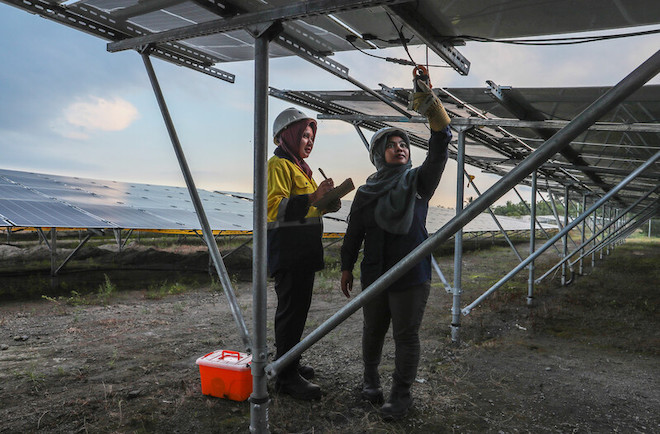
This article is published in collaboration with the Economic Research Institute for ASEAN and East Asia.
Indonesians are increasingly aware of the need to develop in a more sustainable manner. Report after report indicates the rapidly growing problem of plastic waste, including marine plastic debris. While the puzzle of how to build a sustainable future has many pieces, one crucial element is often overlooked: intellectual property (IP) rights.
Transformative and collaborative inventions to drive sustainability in carbon-intensive sectors need to be prioritized. While technology can hasten the transition toward a more sustainable and circular economy, sharing of technology and knowledge, combined with adequate funding, is needed. IP can help.
IP as an innovation enabler
A 2021 paper considers IP rights as essential to enable innovation and diffusion of sustainable technologies, improve collaboration, and foster prosperity in developing countries. Patented technologies are publicly disclosed, ensuring access to technical knowledge of inventions. IP rights grant their owners security against unauthorized use, providing them a source of revenue from exclusive rights. Exclusive rights allow owners to prohibit others from using and benefiting from their inventions. But as technology transfer depends on the willingness of owners to share licences and knowledge, lower-income countries have difficulty adopting sustainable technology.
With its low numbers of patent registrations and high-technological exports, Indonesia depends on technology transfer from higher-income countries. World Bank data show that in 2016–2020, the average number of patent applications was 899,900 in high-income countries and 38,740 in lower-middle-income countries. Similarly, high-tech exports as a share of total manufacturing exports by high-income countries was 21% and by lower- middle income countries about 10% in the same period. Indonesia scores 1,800 and 8% on average for patent applications and high-tech exports respectively, lower than its lower- middle-income neighbors.
Some international agreements recognize the technology challenge faced by lower-income countries. Article 7 of the Agreement on Trade-Related Aspects of Intellectual Property Rights (TRIPS) obligates protection and enforcement of IP rights to contribute and promote mutual technological innovation, transfer, and dissemination. Articles 66.2 and 67 of TRIPS mandate high-income countries to encourage mutually agreed technology transfer, including technical and financial cooperation from their enterprises or institutions, to lower- income countries. Sustainable technology transfer is an essential pillar of the United Nations Framework Convention on Climate Change (UNFCCC). Article 4.5 mandates all developed countries to take practical steps to promote, facilitate, and finance the transfer of or access to environmentally sound technologies to developing countries. Helping lower- income countries obtain sustainable technologies has been a binding commitment of developed countries. But reaching a mutual agreement in technology transfer could be costly and time consuming.
Article 109 of the Indonesian Patent Law allows government patents for products that are of urgent public interest, related to diseases, agriculture resiliency, and natural disasters. Government patent does not reduce the rights of patent owners to exercise their exclusive rights and receive reasonable fees as compensation from the government. The Indonesian Omnibus Law requires patent owners to produce and process their technology in Indonesia to ensure technology and knowledge transfer and absorption of labor. However, the provision has been deemed controversial by the World Trade Organization.
Ramping up an innovative environment
Indonesia could ramp up its efforts to encourage an innovative environment while ensuring opportunities to acquire sustainable technology. Several initiatives can be started with regulation improvement, financial support, digital infrastructure, and research and development (R&D).
The UNFCCC says that artificial intelligence (AI) and digital technology could reduce global carbon dioxide emissions by 10%–20% by 2030. As many sustainable technologies will be increasingly driven by AI, clearer regulations or guidelines will be needed to protect the IP of inventions made using AI technology. The government may find ways to incentivize inventors for their efforts, such as easing registration fees and procedures.
The IP Office’s online registration system can be developed to provide green IP databases and inventories that can connect inventors or IP owners with those who seek sustainable solutions. Through valid databases and networks, the system can bring in key players to invent and diffuse sustainable technology. Strengthening the partnership with the World Intellectual Property Organization (WIPO) through WIPO Green can expedite sustainable technology transfer.
Accelerating sustainable technological invention and transfer requires synergy between institutions. A 2005 book on IP and development found that inventors and IP owners tend to enter licensing contracts with sectors with high innovation and R&D rates. However, World Bank data in 2020 show that Indonesia’s ratio of R&D expenditure to total GDP is lower (0.28%) than that of neighboring countries, including Malaysia, the Philippines, Thailand, and Viet Nam. Indonesia’s R&D should be strengthened, not only to encourage technology transfer but also to centralize new knowledge and inventions.
It is time to recognize that Indonesia’s economic resilience will depend on sustainable and inclusive growth, and understanding the role of IP rights in a sustainable and circular economy is essential. In the end, acknowledging limitations of IP rights and expanding the role of R&D, financing, infrastructure, and political will can help spur sustainable inventions.
This opinion piece was first published by the Economic Research and Institute for ASEAN and East Asia on 31 October 2022.
 Michelle Chandra Kasih
Michelle Chandra Kasih
Research Associate, Economic Research Institute for ASEAN and East Asia (ERIA)
Michelle Chandra Kasih joined ERIA in May 2020. She obtained her bachelor's degree from the Faculty of Law, Gadjah Mada University. She currently supports ERIA's Policy Design Department.
Prior to joining ERIA, she worked as a research assistant for law, gender, and society at the Faculty of Law, Gadjah Mada University. While pursuing her bachelor’s degree, one of her research has been presented at an international conference.


